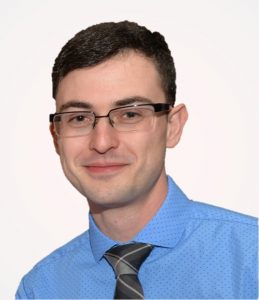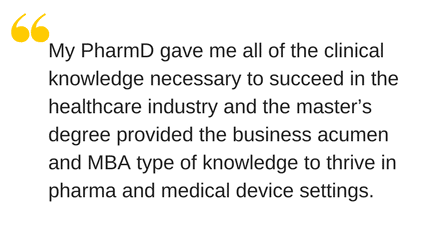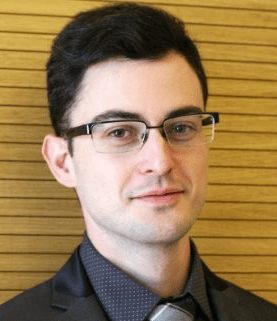
Please describe your current work at Edwards Lifesciences and describe a few of your career highlights.
I currently work in the Global Health Economics and Reimbursement team at Edwards Lifesciences supporting our critical care business unit. Edwards Lifesciences is the leading manufacturer of heart valves and critical care technologies. Our company is responsible for the creation of the Swan-Ganz catheter, and we produce arterial lines and non-invasive hemodynamic monitoring systems in the form of a finger cuff that provides continuous beat to beat blood pressure as well as cardiac output and stroke volume to name a few parameters. My role within the company is to support these products with the creation of economic tools. My largest project to date has been the development and execution of economic calculators built through extensive evidence searches and model development. I have overseen the launch of these calculators in over 10 countries worldwide working with partners in multiple roles to train our sales force of over 300 people on the appropriate use and execution of these tools. My other duties include assisting in evidence generation, creation of educational materials, and the occasional field visit to help support our sales force with economic drivers.
What prompted your interest in the PharmD/MS in Healthcare Decision Analysis dual degree? And how did it help achieve your career goals?
Since as far back as I can remember I have had a tie to pharmacy. My mother was a partner at an independent pharmacy in downtown Los Angeles where I began working after high school while attending college. The option came up for me to manage a new pharmacy that my other boss was about to open and I jumped on the opportunity. While working to obtain my B.S. degree I managed the new pharmacy and began to manage the original one as well. This is when I realized that I had two passions, business and pharmacy. The greatest email I have ever received was my admission to USC Mann. This was going to be my first step towards an industry where I had already set my sights. During my first year, Dr. Grant Lawless came to talk to our class about the Master’s program in Healthcare Decision Analysis (HCDA) and I was sold immediately. A master’s degree that focuses on the pharmaceutical industry was exactly what I had needed. My PharmD gave me all of the clinical knowledge necessary to succeed in the healthcare industry and the master’s degree provided the business acumen and MBA type of knowledge to thrive in pharma and medical device settings.
How did the resources and faculty members at USC help prepare you for what you are doing now?
A world-class education from a world-class institution. From a clinical perspective, my PharmD gave me knowledge of the cardiovascular system necessary to understand this industry at a deep level. My clinical knowledge allows a unique perspective when designing clinical trials and analyzing data. All of the research that we had conducted for Dr. Ian Haworth allows me to find articles and develop tools much more rapidly and analyze them critically thanks to our literature review courses as well as the journal clubs. If I had to choose the single experience that was most beneficial, I would choose Dr. Kevin Forrester’s fourth-year Advance Pharmacy Practice Experience (APPE) rotation. We were stationed in the cardiovascular intensive care unit and I got to see the direct impact of monitoring the types of patients I work with on a daily basis today. From a non-clinical side, the HCDA master’s degree prepared me for this world. Dr. Lawless exposed us to many statistical analyses and how to run them, as well as providing lecture slides which within them contain tools and tips that I still use today in every facet of my work life. Our projects within the many courses had us working in simulated business environments that prepared me for working on a team, interacting with my bosses, and navigating the work I do daily. Dr. Lawless also became one of my most cherished mentors. Without his encouragement and guidance, I would have never ended up where I am today. The entire faculty at USC was always open and willing to talk and provide guidance, and I believe that if one takes advantage of this amazing gift the sky is the limit.

How would you describe the environment at USC Mann when you were a student? What are your favorite memories or highlights of your experience?
The first day you show up to campus you are immediately surrounded by your 200 new best friends. A graduate-level cohort of students who are no longer competing to be #1 but are there to bring one another up is something very special. I look back fondly on the groups of people I studied and completed assignments with. Each new group of people that I would work with had a new dynamic, but the common theme of camaraderie and studiousness was always present. The faculty too are some of the best in the world at what they do, yet are humble and always cared about our success. A big highlight of this for me was another APPE rotation with Dr. Cynthia Lieu. Our unique group of people had to work together on larger tasks where we were given autonomy to manage our patients, yet we also had a preceptor who cared and always kept us on track. This type of education and environment was instrumental to my growth at USC.
What advice do you have for students who may be interested in following a similar path to yours?
Never give up! My fond memories also include late nights studying and many clumps of pulled hair. The path that we take is not an easy one, else everyone would do it, but it is a rewarding one. With that said, I believe that the only people that truly succeed are the ones who love what they do. My first piece of advice is to really think about what you want to spend your life doing when money is not part of the question. I love the field of pharmacy, I enjoy business, and that is why I am where I am. If one were to pursue a career in pharma simply because of the dollar signs without passion, I don’t think they would be as successful as someone who genuinely loves what they do. Once you know what you want to do, the next step is to do it well. There is something to be said about the “who you know not what you know” but that will only take you as far as the door. If you want to move up you must strive to always be the best at what you do. I would like to answer this question like this… A hero isn’t someone who does something because they have the strength to do it, but someone who finds the strength to do something they know is right. My advice is to find the strength to be your own hero and follow the hard path to what you love, it will make you stronger when you arrive.
Is there anything else about your experience at USC that you’d like to share? What does the phrase “Trojan family” mean to you?
Trojan family is itself a feeling like brotherhood. I choose to think of the Trojan Family the same way I think of a family of soldiers in a war. School is not easy, but we brothers and sisters band together to complete it. This thing we share by having gone through the same trials and tribulations is what binds us. When you see a fellow Trojan you know they are at least as capable as you because they went through the same walk of fire as you. This family is banded together by a shared knowledge that we didn’t just get an education together, we succeeded in getting a hard education from a world-class institution. To me, it is the same thing as loving your brother that you grew up with, you shared so many experiences, and overcame them, and now you are bonded for more reasons than just blood and birth.


